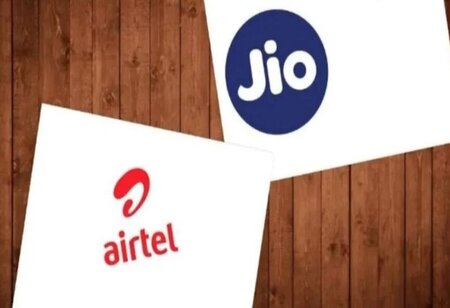Jio and Airtel are at Odds Once More over DTH Operators' License Fees
Reliance Jio Infocomm and Bharti Airtel, two telecom companies, are at odds once more over whether to waive the license cost for direct-to-home (DTH) operators. The former wants to keep the fee in place, while the latter wants to phase it out eventually.
During the Telecom Regulatory Authority of India's (TRAI) consultation on the "Framework for Service Authorizations for the Provision of Broadcasting Services under the Telecommunications Act, 2023," both businesses gave their opinions.
In order to achieve equivalence between DTH and other TV distribution platforms that are not subject to license fees, Airtel has demanded that the license price be eliminated entirely.
Additionally, Tata Play has encouraged the TRAI to abolish the cross-media prohibitions that prohibit broadcasters from owning more than 20% of a distribution company and to put the recommendations into effect as soon as possible.
Additionally, Airtel said that since broadcasters are the ones who stand to gain the most from content revenue, they need to pay the license charge that is currently assessed on that revenue and paid by DTH operators.
Furthermore, Airtel proposed that DTH licensees be subject to the Cabinet's definitions of Gross Revenue (GR), Applicable Gross Revenue (ApGR), and Adjusted Gross Revenue (AGR) as they pertain to the telecom industry.
Jio, on the other hand, has argued against the waiver, claiming that DTH providers profit from free spectrum allocation, which is priced much lower than market pricing.
Jio contended that this gives DTH operators an unfair edge over cable TV and internet protocol television (IPTV) providers and results in revenue losses for the national exchequer.
Additionally, the operator controlled by Reliance Industries said that it was under Article 14 of the Indian Constitution to waive the license price based just on comparisons with other platforms, ignoring the special advantages DTH receives from free spectrum. Jio pointed out that this provision does not demand that everyone with pertinent differences be treated in the same way.
Jio also underlined that while fixed-line and mobile service providers, who make significant investments in infrastructure and spectrum, continue to pay license fees, DTH operators, who rely on free spectrum and forego investments in terrestrial fiber or 8 cable networks, should not be eligible for fee waivers.
The Ministry of Information and Broadcasting (MIB) was advised by TRAI in August 2023 to lower the DTH license cost from the current 8% to 3% of AGR, with the goal of completely eliminating it by FY27. The goal of this advice was to level the playing field between DTH and other TV distribution services including IPTV, HITS, and cable TV.
Jio further sought TRAI to conduct an independent analysis, independent of prior recommendations, of the competitive advantages that DTH providers enjoy over fixed-line, cable TV, and mobile services as a result of the free spectrum allocation.
While Jio operates cable networks like DEN Networks and Hathway Cable & Datacom and owns a sizeable portion in GTPL Hathway, Airtel owns the DTH operator Bharti Telemedia, which operates under the Airtel Digital TV brand.
The purpose of TRAI's consultation is to advise MIB on how to create a framework for broadcasting service authorization under the Telecommunications Act, 2023, which superseded the Indian Telegraph Act, 1885. Under a single telecommunications framework, this framework aims to simplify broadcasting laws pertaining to DTH, IPTV, and radio transmission.
DTH operators had previously been asked to pay the MIB 10% of their gross revenue, without deductions. However, DTH operators have calculated a "Licence Fee Payable GR" and paid 10% of that amount after making a variety of deductions under various revenue categories.
The four commercial DTH providers could be liable for more than Rs 15,000 crore in license fees. In addition to contesting the license price calculation and the constitutionality of the outdated DTH standards—which were superseded by new operating guidelines in 2022—they have contested the MIB's demand notices. The Supreme Court is still considering the case.
🍪 Do you like Cookies?
We use cookies to ensure you get the best experience on our website. Read more...






